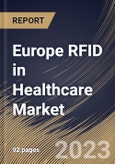Medical organizations, including pharmaceutical firms, hospitals, blood banks, and others, often employ RFID for workflow management. It may be used for inventory management, reducing medical mistakes, and effectively using healthcare resources. The market is expanding due to growing demand for innovative and cost-effective treatments and increased hospital and retail pharmacy use of pharmacy automation. Additionally, the industry is expanding as patient convenience and safety are given more attention. Developing non-profit R&D initiatives and using tactics like growth, acquisitions, and partnerships to produce cutting-edge technologies to support RFID in healthcare is assisting the market's continued expansion.
RFID incorporation into pharmaceutical items helps to increase patient safety by providing more precise monitoring and identification of medicines across the whole supply chain. It aims to decrease mistake rates to nearly zero. It also does away with the necessity for costly and, more critically in the present situation, labor-intensive internal drug labeling, significantly reducing hospital personnel's workload.
The UK has the chance to lead the world in health technology. The nation already has some of the top health technology companies in the world, which helps with discoveries and raises the profile of the nation's solid scientific and research basis internationally. The government has the opportunity to create an ecosystem that regularly generates the best health technology, which can be exported combined with cutting-edge methods and insights that help enhance health outcomes internationally. According to the European Regional Development Fund, Germany and the EU both value the healthcare and life sciences (HCT) industry. The national government also encourages using advanced medical technologies like RFID and nanotechnology. These factors are projected to promote the regional market’s growth.
The Germany market dominated the Europe RFID in Healthcare Market by Country in 2022, and would continue to be a dominant market till 2030; thereby, achieving a market value of $882.1 million by 2030. The UK market is anticipated to grow at a CAGR of 16% during (2023-2030). Additionally, The France market would showcase a CAGR of 17.9% during (2023-2030).
Based on Application, the market is segmented into Asset Tracking, Pharmaceutical Tracking, Patient Tracking, Blood Tracking and Others. Based on Product, the market is segmented into Tags and Systems & Software. Based on countries, the market is segmented into Germany, UK, France, Russia, Spain, Italy, and Rest of Europe.
The market research report covers the analysis of key stake holders of the market. Key companies profiled in the report include Honeywell International, Inc., Alien Technology, LLC, Zebra Technologies Corp., Avery Dennison Corporation, Impinj, Inc., 3M Company, Invengo Technology Pte. Ltd., Siemens AG, Fujitsu Limited and Terso Solutions, Inc. (Promega Corporation).
Scope of the Study
By Application
- Asset Tracking
- Pharmaceutical Tracking
- Patient Tracking
- Blood Tracking
- Others
By Product
- Tags
- Systems & Software
By Country
- Germany
- UK
- France
- Russia
- Spain
- Italy
- Rest of Europe
Key Market Players
List of Companies Profiled in the Report:
- Honeywell International, Inc.
- Alien Technology, LLC
- Zebra Technologies Corp.
- Avery Dennison Corporation
- Impinj, Inc.
- 3M Company
- Invengo Technology Pte. Ltd.
- Siemens AG
- Fujitsu Limited
- Terso Solutions, Inc. (Promega Corporation)
Unique Offerings
- Exhaustive coverage
- The highest number of Market tables and figures
- Subscription-based model available
- Guaranteed best price
- Assured post sales research support with 10% customization free
Table of Contents
Companies Mentioned
- Honeywell International, Inc.
- Alien Technology, LLC
- Zebra Technologies Corp.
- Avery Dennison Corporation
- Impinj, Inc.
- 3M Company
- Invengo Technology Pte. Ltd.
- Siemens AG
- Fujitsu Limited
- Terso Solutions, Inc. (Promega Corporation)







